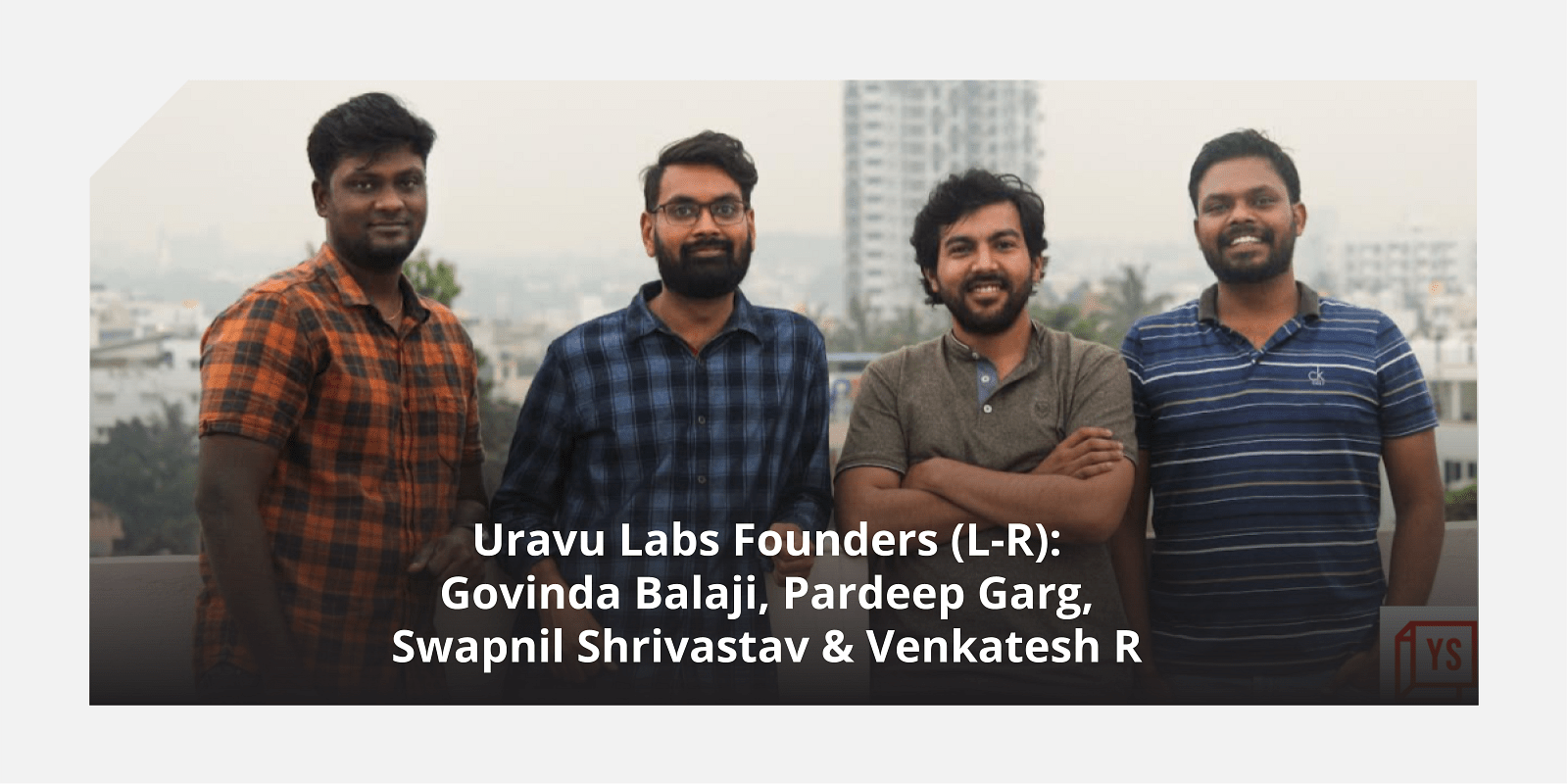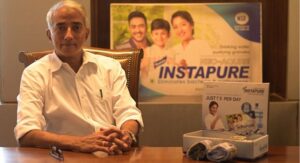It is the age of renewable revolution, and we see it taking place every day in the way we produce and consume energy. Take for example photovoltaic solar energy, the conversion of solar radiation to electricity, or wind energy, the use of wind turbines to generate electricity.
The electricity sector aside, the one area where innovation is the urgent need of the hour is the water sector, and towards this, Bengaluru-based water tech startup Uravu Labs is looking at generating water from renewable sources.
“Uravu Labs is changing the landscape by bringing the first-ever 100 percent renewable water technology that is scalable, affordable, and can be used in multiple applications,” says Pardeep Garg, Co-founder, Uravu Labs.
Founded in 2019 by Pardeep, Swapnil Shrivastav, Venkatesh R and Govinda Balaji, Uravu has developed a technology that is 100 percent renewable, and which utilises atmospheric moisture and only renewable energy to produce drinking water.
“Only when we use renewable energy to produce water from air can we deem it to be 100 percent renewable. Uravu’s technology makes use of desiccants and undergoes two phases – a) adsorption, and b) desorption,” Pardeep says.
For those unversed, adsorption is the process by which a solid holds molecules of a gas or liquid or solute as a thin film, and desorption is the release of an adsorbed substance from a surface.
These two phases together make a cycle.
a) Adsorption – During the adsorption phase, moisture in the ambient air is sucked into the system and passed over the desiccant material. This moisture is adsorbed by the desiccant material over a period of a couple of hours.
b) Desorption – The earlier adsorbed moisture is later desorbed using thermal heat available at temperatures of less than 90 C. Heat can be sourced from solar collectors, waste-heat from industries, or even biomass waste, and is utilized to heat up a heat-transfer fluid (eg. water) using a heat exchanger, which in a closed loop then heats up the desiccant material to required temperatures and releases the earlier adsorbed moisture. This released moisture is then condensed at ambient temperature in an air-cooled condenser forming pure and 100 percent renewable water. Desorption phase also runs for a couple of hours.
Uravu’s system undergoes multiple cycles of adsorption and desorption throughout the day and night, effectively running 24×7.
The startup uses standard components and commercially available desiccant materials making it easy to manufacture, scale, and maintain. “Also, our solution is cost-efficiently designed to capture moisture even when humidity is around 30 percent, making it geography agnostic,” adds Pardeep.
Uravu also plans to make products in various capacities- mainly 20 litres per day (LPD), 100 LPD, and over 2000 LPD modules which can serve applications in different markets. The 20-100 LPD units are useful in households and commercial spaces like offices, schools, hotels, etc; while the over 2000 LPD units are targeted for use in the beverage industry.
An illustration of a 20 LPD device for rooftops
The initial days
Swapnil and Venkatesh, graduates of National Institute of Technology (NIT), Calicut, experienced water shortage first hand when the coastal city, known for heavy rainfall, was deprived of water and experienced a long dry spell in 2016. The duo were soon inspired to work on the problem.
In 2016, right after graduation, the two started evaluating the ‘water-from-air’ concept seriously.
A year later, they developed an electricity-based conventional atmospheric water generator (AWG) which was akin to products from competitors like Akvo (India), VayuJal (India), and Watergen. Though it worked well, the machine consumed a lot of electricity. Since electricity is not always renewable, this method of generating water from air was also not seen as renewable. Also, refrigerants used in such devices have strong global warming potential.
And the duo wanted to come up with something that was 100 percent renewable.
Then, in 2019, Swapnil met Pardeep Garg, a PhD holder from the Indian Institute of Science, Bengaluru, who was also a research fellow at the Massachusetts Institute of Technology (MIT), US.
Pardeep’s background in new technologies in the energy space was a great advantage. Together, the team started working on the inception of renewable water technology, but they were still short of a product developer who could be responsible for the engineering piece of the overall project. The team found who they were looking for in Balaji, “someone who can convert blueprints into reality,” says Pardeep. In Oct 2019, the team incorporated Uravu Labs Pvt Ltd and finally, the dots started connecting.
Uravu now comprises a 15-member multidisciplinary team, with backgrounds in mechanical, electrical, architecture, and embedded engineering with a core in thermal sciences and systems design.
“The initial journey from the ideation phase to the prototype level and then to the traction level also requires funding support. We were lucky to have received several grants from time to time that kept the company going. Besides this, we were also one of the top five global finalists in the Water Abundance XPrize which gave us a lot of room to keep the momentum going in the early days,” Pardeep says. The Water Abundance XPRIZE is a $1.75 million competition, challenging teams to alleviate the global water crisis.
The USP
Uravu Labs’ USP is 100 percent renewable water, say the founders.
Though there are many companies that produce water from air – more than 95 percent of companies (Watergen (Israel), Akvo (India), WaterMaker (India), Yayujal (India), etc) are focused on a technology based on the air-conditioning effect.
“There has not been even a single product in the water space which helps the beverage industry to go renewable,” says Pardeep.
“Further, we are working on applications beyond solar heat; for example, waste heat and biomass could be the sources of heat as well, which no competitor can replicate. In short, we believe that whatever best was possible in the AWG (atmospheric water generation) landscape using desiccants, Uravu has occupied that territory through its strong patent applications and proprietary technology,” adds Pardeep.
Funding and monetisation
The startup has just raised pre-seed capital, and can be considered to be pre-revenue with three pre-paid pilot orders it has received. The funds raised in this round will be utilised to scale up the company activities and the prototype capacities. To commercialise the technology, the company will look forward to raising an additional round. Currently, the focus is on building and perfecting the technology while trying to gain early traction in the form of small-scale pilots in the beverage and the real estate space.
According to the founders, the startup has two possibilities for monetisation –
- The customer buys the Uravu machine and gets water without incurring any further opex, OR
- Uravu installs the machine as an owned asset and distributes the renewable water on a service basis to the end customer.
The way ahead
According to Pardeep, the packaged water market size alone is over $300 billion globally. “When we account for soft drinks and alcoholic products, we see the total consumer spend to be around $1.5 trillion and growing. While consumer spending is huge, Uravu sees great opportunities further up the supply chain to deliver tailored solutions for the beverage companies – large and upcoming,” he adds.
For Uravu Labs, the next 12 months are focused on scaling the technology to 20 LPD to 100 LPD, and deploying field pilots with strategic customers in the beverage and real estate space.
“Clients focused on water sustainability have a strong desire to create strategic and measurable outcomes, and Uravu can help deliver those. We aim to work closely with such clients and develop long-term relationships while also showcasing innovative technology,” says Pardeep.
The startup plans to work with corporations on CSR efforts, and with government agencies like Jal Shakti, MNRE etc to deliver clean drinking water to remote and rural areas.









